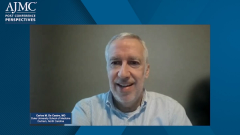
Selecting Optimal Treatment Therapies for PNH
Dr De Castro provides an overview of IV versus oral therapies for patients with PNH.
Carlos M. De Castro, MD: If you look at complements, they’re activated in 3 ways. There’s the classical pathway, an antibody-antigen; the lectin pathway; and the alternative pathway. All of them converge at C3. The big 1 in PNH [paroxysmal nocturnal hemoglobinuria] is the alternative pathway, which amplifies quickly once you get it started. Factor B and factor D are needed as cofactors in that pathway. C3 will go on to activate C5, and C5 will then activate C6, C7, C8, and C9, which form the membrane attack complex, which puts a pore into the cell or bacteria and causes lysis. If you block at C5, you block that extravascular hemolysis. It’s a very effective means of blocking complement in terms of PNH.
But C3 is still activated and gets on the surface of the red cells, and the PNH red cells have no way to remove that because they’re missing certain GPI-anchored proteins, such as CD55 and CD59. They build up C3 fragments on their surface, and that’s what leads to the extravascular hemolysis outside, in the spleen and liver. These newer drugs that are proximal complement inhibitors, such as C3 or factor B or factor D, block that process also. There’s no buildup of C3 fragments on the red cells.
More people would probably prefer taking a pill than getting a shot or an IV [intravenous] drug. Ravulizumab is convenient, though, because it’s given every 8 weeks intravenously or subcutaneously. But it’s still a shot, and people don’t like that. Oral therapy will probably be preferred by patients with PNH down the line. If you have problems with compliance, then maybe we have to give IV or subcutaneously to make sure you get the drug. But more patients are going to say, “No, I’d rather be on a pill, even if taken twice a day.” How is that going to change access? I’m not clear on that. We have to wait and see. Certainly, it’s easy for patients to take a pill if you give a prescription. You’re still going to have to monitor these patients fairly closely during the initial treatment phase and later.
FDA approval of iptacopan
Transcript edited for clarity.
Newsletter
Stay ahead of policy, cost, and value—subscribe to AJMC for expert insights at the intersection of clinical care and health economics.









